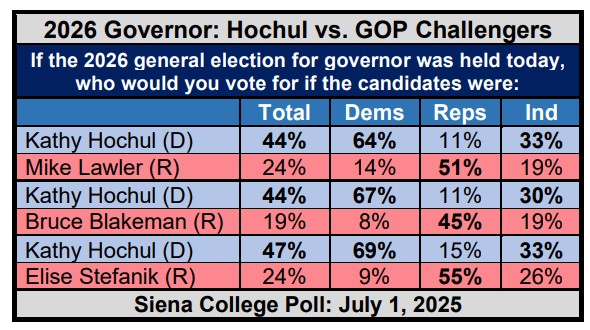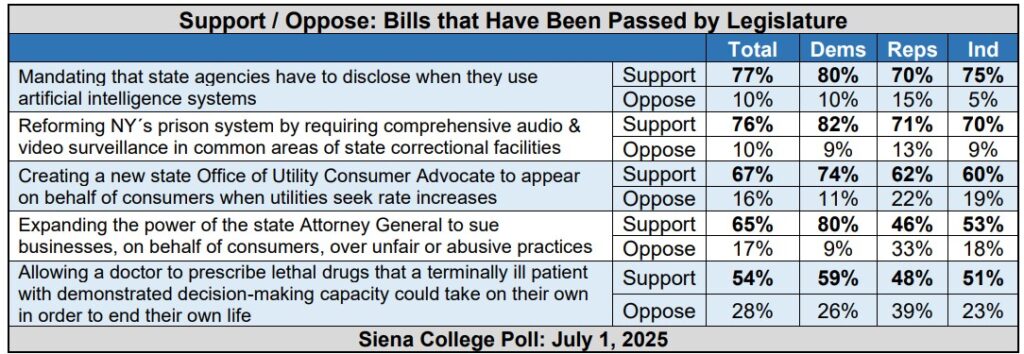- Hochul Maintains Huge Lead Over Delgado and Torres with Dems; Stefanik Has Large Lead Over Lawler, Huge Lead Over Blakeman with Reps
- Majority Continues to Support Medical Aid in Dying, 54-28%, Which Recently Passed the Legislature; Strong Support for Other Recently Passed Bills: Mandating State Agencies Disclose Use of AI; Prison Reform; Creating Utility Consumer Advocate
Loudonville, NY. Governor Kathy Hochul – whose favorability, job approval, and generic re-elect numbers are little changed from last month – leads each of three potential Republican 2026 gubernatorial candidates by at least 20 points, according to a new Siena College Poll of New York State registered voters released today. Hochul leads Nassau County Executive Bruce Blakeman 44-19%; she leads Representative Elise Stefanik 47-24%; and she leads Representative Mike Lawler 44-24%.
One year out from potential gubernatorial primaries, Democrats overwhelmingly favor Hochul (49%) over Lt. Governor Antonio Delgado (12%) and Representative Ritchie Torres (10%) – little changed from May – and Republicans strongly favor Stefanik (35%) over Lawler (18%) and Blakeman (7%), also similar to last month. New Yorkers support allowing doctors to prescribe lethal drugs to a terminally ill patient that they could take on their own to end their own life, 54-28%, little changed from 58-30% in November 2023, when Siena last asked.
“Recognizing that 16 months in politics is many lifetimes away, a first look at how New York voters feel about potential gubernatorial matchups shows that partisanship wins out. Hochul leads Lawler by 20 points, Stefanik by 23 points and Blakeman by 25 points,” Siena College Research Institute Director Don Levy said.
“Unsurprisingly, Hochul leads with Democrats in all three potential gubernatorial matchups by between 50 and 60 points, and she trails in all three with Republicans by between 34 and 40 points. She leads with independents by between 7 and 14 points,” Levy said.

“While the early leads seem large, Hochul is not hitting the ‘magic’ 51% mark against any of these opponents, and in each matchup, between a quarter and a third of voters wasn’t able to choose between the two candidates,” Levy said.
Hochul’s favorability rating is 42-47%, down slightly from 44-46% in May. Her job approval rating is 50-45%, barely changed from 50-46% last month. Currently, 37% are prepared to re-elect Hochul, while 55% want ‘someone else,’ little changed from 36-55% last month. Stefanik has a 25-32% favorability rating (25-35% last month), while Lawler’s is 22-24% (from 22-25%) and Blakeman’s is 16-17% (from 17-16%). Delgado has a 24-18% favorability rating (from 25-18%) and Torres has a 22-18% favorability rating (from 22-20%).
“One year out from a potential primary, two in five Republicans don’t know who they’ll support among Stefanik, Lawler and Blakeman, but Stefanik maintains an early lead, 17 points ahead of Lawler, who is 11 points ahead of Blakeman,” Levy said. “On the Democratic side, Hochul has huge leads of 37 points over Delgado and 39 points over Torres, each of whom remains largely unknown to more than half of Democrats.”
Medical Aid in Dying Supported Nearly 2-to-1; Other End of Session Bills Have Overwhelming Support

“While it doesn’t have the same level of support as several other less controversial bills that passed the Legislature at the end of session, voters support what some call medical aid in dying and others call physician assisted suicide, 54-28%. It has better than two-to-one support from Democrats and independents, and Republicans support it 48-39%,” Levy said. “It has support from at least 53% of voters from every region of the state, and at least 54% support from young, middle-aged and older voters. Jewish voters, 53-30%, and Catholic voters, 52-30%, support it at virtually equal levels.
“Mandating state agencies to disclose AI usage, requiring audio and video surveillance in state prisons, establishing a new utility consumer advocate, and allowing the AG to sue companies over unfair or abusive practices all enjoy support from at least two-thirds of New Yorkers, including majority or plurality support from Democrats, Republicans and independents on each,” Levy said.
Odds & Ends
- By 44-37%, voters say Manhattan’s congestion pricing tolling plan should be eliminated, up a little from 41-39% in May. Democrats, 51-30%, say congestion pricing should remain, while three-quarters of Republicans and a plurality of independents want it scrapped. A plurality of New York City voters want it to remain, while downstate suburbanites want it eliminated two-to-one, 58-29%.
- Voters are considerably less optimistic about the direction of the state this month, saying that New York is headed in the wrong direction (50%) rather than on the right track (37%). In May, voters thought the state was headed in the wrong direction by a much narrower 46-43%.
- As the 2025 legislative session ends, both houses of the Legislature enjoy positive favorability ratings. The Assembly’s is 44-35% (from 41-35% in May) and the Senate’s is 45-37% (from 42-37%).
###
This Siena College Poll was conducted June 23-26, 2025, among 800 NYS Registered Voters. Of the 800 respondents, 499 were contacted through a dual frame (landline and cell phone) mode (151 completed via text to web) and 301 respondents were drawn from a proprietary online panel (Cint). Telephone calls were conducted in English and respondent sampling was initiated by asking for the youngest person in the household. Telephone sampling was conducted via a stratified dual frame probability sample of landline and cell phone telephone numbers weighted to reflect known population patterns. The landline telephone sample was obtained from ASDE and the cell phone sample was obtained from MSG. Interviews conducted online are excluded from the sample and final analysis if they fail any data quality attention check question. Duplicate responses are identified by their response ID and removed from the sample. Three questions were asked of online respondents including a honey-pot question to catch bots and two questions ask the respondent to follow explicit directions. The proprietary panel also incorporates measures that “safeguard against automated bot attacks, deduplication issues, fraudulent VPN usage, and suspicious IP addresses”. Coding of open-ended responses was done by a single human coder. Data from collection modes was weighted to balance sample demographics to match estimates for New York State’s population using data from the Census Bureau’s 2023 U.S. American Community Survey (ACS), on age, region, race/ethnicity, education, and gender to ensure representativeness. The sample was also weighted to match current patterns of party registration using data from the New York State Board of Elections. It has an overall margin of error of +/- 4.4 percentage points including the design effects resulting from weighting. Sampling error is only one of many potential sources of error and there may be other unmeasured error in this or any other public opinion poll. The Siena College Research Institute, directed by Donald Levy, Ph.D., conducts political, economic, social, and cultural research primarily in NYS. SCRI, an independent, non-partisan research institute, subscribes to the American Association of Public Opinion Research Code of Professional Ethics and Practices. For more information, call Dr. Don Levy at (518) 783-2901. For survey crosstabs: www.Siena.edu/SCRI/SNY.





